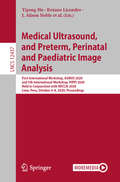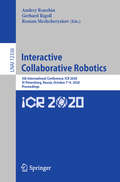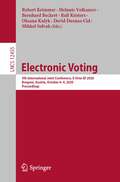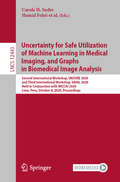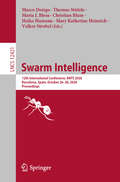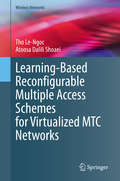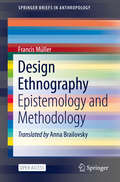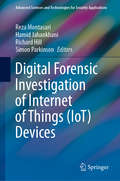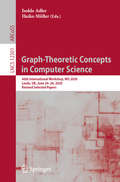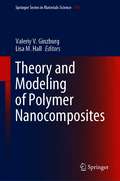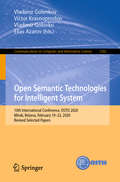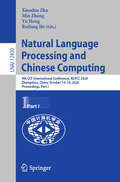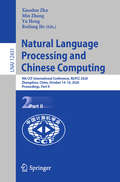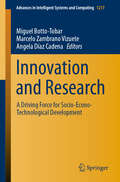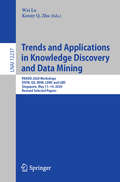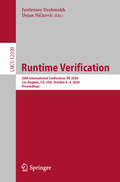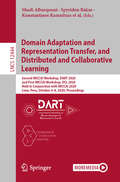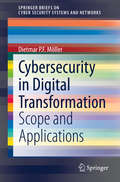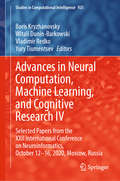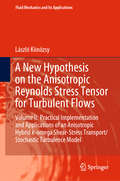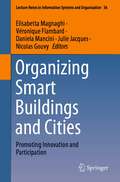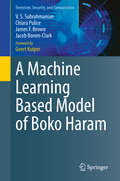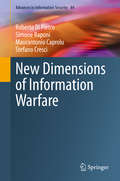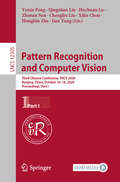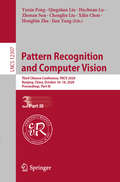- Table View
- List View
Medical Ultrasound, and Preterm, Perinatal and Paediatric Image Analysis: First International Workshop, ASMUS 2020, and 5th International Workshop, PIPPI 2020, Held in Conjunction with MICCAI 2020, Lima, Peru, October 4-8, 2020, Proceedings (Lecture Notes in Computer Science #12437)
by Yipeng Hu Roxane Licandro J. Alison Noble Jana Hutter Stephen Aylward Andrew Melbourne Esra Abaci Turk Jordina Torrents BarrenaThis book constitutes the proceedings of the First International Workshop on Advances in Simplifying Medical UltraSound, ASMUS 2020, and the 5th International Workshop on Perinatal, Preterm and Paediatric Image Analysis, PIPPI 2020, held in conjunction with MICCAI 2020, the 23rd International Conference on Medical Image Computing and Computer-Assisted Intervention. The conference was planned to take place in Lima, Peru, but changed to an online event due to the Coronavirus pandemic. For ASMUS 2020, 19 contributions were accepted from 26 submissions; the 14 contributions from the PIPPI workshop were carefully reviewed and selected from 21 submissions. The papers were organized in topical sections named: diagnosis and measurement; segmentation, captioning and enhancement; localisation and guidance; robotics and skill assessment, and PIPPI 2020.
Interactive Collaborative Robotics: 5th International Conference, ICR 2020, St Petersburg, Russia, October 7-9, 2020, Proceedings (Lecture Notes in Computer Science #12336)
by Andrey Ronzhin Gerhard Rigoll Roman MeshcheryakovThis book constitutes the proceedings of the 5th International Conference on Interactive Collaborative Robotics, ICR 2020, held in St. Petersburg, Russia, in October 2020. The 31 papers presented were carefully reviewed and selected from 62 submissions. Challenges of human-robot interaction, robot control and behavior in social robotics and collaborative robotics, as well as applied robotic and cyber-physical systems are mainly discussed in the papers.
Electronic Voting: 5th International Joint Conference, E-Vote-ID 2020, Bregenz, Austria, October 6–9, 2020, Proceedings (Lecture Notes in Computer Science #12455)
by Robert Krimmer Melanie Volkamer Ralf Küsters David Duenas-Cid Bernhard Beckert Oksana Kulyk Mikhel SolvakThis book constitutes the proceedings of the 5th International Conference on Electronic Voting, E-Vote-ID 2020, held online -due to COVID -19- in Bregenz, Austria, in October 2020. The 14 full papers presented were carefully reviewed and selected from 55 submissions.The conference collected the most relevant debates on the development of Electronic Voting, from aspects relating to security and usability through to practical experiences and applications of voting systems, also including legal, social or political aspects, amongst others; turning out to be an important global referent in relation to this issue.
Uncertainty for Safe Utilization of Machine Learning in Medical Imaging, and Graphs in Biomedical Image Analysis: Second International Workshop, UNSURE 2020, and Third International Workshop, GRAIL 2020, Held in Conjunction with MICCAI 2020, Lima, Peru, October 8, 2020, Proceedings (Lecture Notes in Computer Science #12443)
by Tal Arbel Enzo Ferrante Sarah Parisot Aristeidis Sotiras Adrian Dalca Bartlomiej Papiez William M. Wells Ryutaro Tanno Carole H. Sudre Hamid Fehri Christian F. Baumgartner Koen Van LeemputThis book constitutes the refereed proceedings of the Second International Workshop on Uncertainty for Safe Utilization of Machine Learning in Medical Imaging, UNSURE 2020, and the Third International Workshop on Graphs in Biomedical Image Analysis, GRAIL 2020, held in conjunction with MICCAI 2020, in Lima, Peru, in October 2020. The workshops were held virtually due to the COVID-19 pandemic.For UNSURE 2020, 10 papers from 18 submissions were accepted for publication. They focus on developing awareness and encouraging research in the field of uncertainty modelling to enable safe implementation of machine learning tools in the clinical world. GRAIL 2020 accepted 10 papers from the 12 submissions received. The workshop aims to bring together scientists that use and develop graph-based models for the analysis of biomedical images and to encourage the exploration of graph-based models for difficult clinical problems within a variety of biomedical imaging contexts.
Swarm Intelligence: 12th International Conference, ANTS 2020, Barcelona, Spain, October 26–28, 2020, Proceedings (Lecture Notes in Computer Science #12421)
by Marco Dorigo Thomas Stützle Maria J. Blesa Christian Blum Heiko Hamann Mary Katherine Heinrich Volker StrobelThis book constitutes the proceedings of the 12th International Conference on Swarm Intelligence, ANTS 2020, held online -due to COVID-19- in Barcelona Spain, in October 2020. The 20 full papers presented , together with 8 short papers and 5 extended abstracts were carefully reviewed and selected from 50 submissions. ANTS 2020 contributions are dealing with any aspect of swarm intelligence.
Learning-Based Reconfigurable Multiple Access Schemes for Virtualized MTC Networks (Wireless Networks)
by Tho Le-Ngoc Atoosa Dalili ShoaeiThis book assists readers with understanding the key aspects, problems and solutions related to the design of proper Multiple Access Schemes for MTC (Machine-Type Communications) and IoT applications in 5G-and-beyond wireless networks. An overview of MTC applications and their traffic features are also provided. In addition, it presents a comprehensive review of MTC access schemes including orthogonal multiple access schemes (OMA), non-orthogonal multiple access schemes (NOMA), massive MIMO-based schemes and fast uplink grant approaches. It also proposes efficient and reconfigurable access schemes deploying machine learning and optimization techniques to address the main requirements of MTC networks. This book discusses potential research directions to further enhance the performance of MTC access schemes.Machine-type communications are expected to account for the dominant share of the traffic in future wireless networks. While in traditional wireless networks, designed for human-type communications, the focus is on support of large packet sizes in downlink, machine-type communication systems deal with heavy uplink traffic. This is due to the nature of the tasks performed by machine-type communication devices, which is mainly reporting measured data or a detected event. Furthermore, in these networks, using the virtualization framework, the network infrastructure can be shared between different applications for which providing isolation is of high importance. To support these unique characteristics of machine-type communications, proper access schemes need to be developed, which is the focus of this book.This book benefits advanced-level students studying computer science and electrical engineering as a secondary textbook and researchers working in this field. Engineers and practitioners interested in the challenges and practical solutions of integrating MTC in the cloud radio access network of 5G-and-beyond cellular systems will want to purchase this book as well.
Design Ethnography: Epistemology and Methodology (SpringerBriefs in Anthropology)
by Francis MüllerThis open access book describes methods for research on and research through design. It posits that ethnography is an appropriate method for design research because it constantly orients itself, like design projects, towards social realities. In research processes, designers acquire project-specific knowledge, which happens mostly intuitively in practice. When this knowledge becomes the subject of reflection and explication, it strengthens the discipline of design and makes it more open to interdisciplinary dialogue. Through the use of the ethnographic method in design, this book shows how design researchers can question the certainties of the everyday world, deconstruct reality into singular aesthetic and semantic phenomena, and reconfigure them into new contexts of signification. It shows that design ethnography is a process in which the epistemic and creative elements flow into one another in iterative loops. The goal of design ethnography is not to colonize the discipline of design with a positivist and objectivist scientific ethos, but rather to reinforce and reflect upon the explorative and searching methods that are inherent to it. This innovative book is of interest to design researchers and professionals, including graphic artists, ethnographers, visual anthropologists and others involved with creative arts/media.
Digital Forensic Investigation of Internet of Things (Advanced Sciences and Technologies for Security Applications)
by Reza Montasari Hamid Jahankhani Richard Hill Simon ParkinsonThis book provides a valuable reference for digital forensics practitioners and cyber security experts operating in various fields of law enforcement, incident response and commerce. It is also aimed at researchers seeking to obtain a more profound knowledge of Digital Forensics and Cybercrime. Furthermore, the book is an exceptional advanced text for PhD and Master degree programmes in Digital Forensics and Cyber Security. Each chapter of this book is written by an internationally-renowned expert who has extensive experience in law enforcement, industry and academia. The increasing popularity in the use of IoT devices for criminal activities means that there is a maturing discipline and industry around IoT forensics. As technology becomes cheaper and easier to deploy in an increased number of discrete, everyday objects, scope for the automated creation of personalised digital footprints becomes greater. Devices which are presently included within the Internet of Things (IoT) umbrella have a massive potential to enable and shape the way that humans interact and achieve objectives. These also forge a trail of data that can be used to triangulate and identify individuals and their actions. As such, interest and developments in autonomous vehicles, unmanned drones and ‘smart’ home appliances are creating unprecedented opportunities for the research communities to investigate the production and evaluation of evidence through the discipline of digital forensics.
Graph-Theoretic Concepts in Computer Science: 46th International Workshop, WG 2020, Leeds, UK, June 24–26, 2020, Revised Selected Papers (Lecture Notes in Computer Science #12301)
by Isolde Adler Haiko MüllerThis book constitutes the revised papers of the 46th International Workshop on Graph-Theoretic Concepts in Computer Science, WG 2020, held in Leeds, UK, in June 2020. The workshop was held virtually due to the COVID-19 pandemic. The 32 full papers presented in this volume were carefully reviewed and selected from 94 submissions. They cover a wide range of areas, aiming to present emerging research results and to identify and explore directions of future research of concepts on graph theory and how they can be applied to various areas in computer science.
Theory and Modeling of Polymer Nanocomposites (Springer Series in Materials Science #310)
by Valeriy V. Ginzburg Lisa M. HallThis edited volume brings together the state of the art in polymer nanocomposite theory and modeling, creating a roadmap for scientists and engineers seeking to design new advanced materials. The book opens with a review of molecular and mesoscale models predicting equilibrium and non-equilibrium nanoscale structure of hybrid materials as a function of composition and, especially, filler types. Subsequent chapters cover the methods and analyses used for describing the dynamics of nanocomposites and their mechanical and physical properties. Dedicated chapters present best practices for predicting materials properties of practical interest, including thermal and electrical conductivity, optical properties, barrier properties, and flammability. Each chapter is written by leading academic and industrial scientists working in each respective sub-field. The overview of modeling methodology combined with detailed examples of property predictions for specific systems will make this book useful for academic and industrial practitioners alike.
Open Semantic Technologies for Intelligent System: 10th International Conference, OSTIS 2020, Minsk, Belarus, February 19–22, 2020, Revised Selected Papers (Communications in Computer and Information Science #1282)
by Vladimir Golenkov Victor Krasnoproshin Vladimir Golovko Elias AzarovThis book constitutes the refereed proceedings of the 10th International Conference on Open Semantic Technologies for Intelligent System, OSTIS 2020, held in Minsk, Belarus, in February 2020.The 14 revised full papers and 2 short papers were carefully reviewed and selected from 62 submissions. The papers mainly focus on standardization of intelligent systems and cover wide research fields including knowledge representation and reasoning, semantic networks, natural language processing, temporal reasoning, probabilistic reasoning, multi-agent systems, intelligent agents.
Natural Language Processing and Chinese Computing: 9th CCF International Conference, NLPCC 2020, Zhengzhou, China, October 14–18, 2020, Proceedings, Part I (Lecture Notes in Computer Science #12430)
by Xiaodan Zhu Min Zhang Yu Hong Ruifang HeThis two-volume set of LNAI 12340 and LNAI 12341 constitutes the refereed proceedings of the 9th CCF Conference on Natural Language Processing and Chinese Computing, NLPCC 2020, held in Zhengzhou, China, in October 2020.The 70 full papers, 30 poster papers and 14 workshop papers presented were carefully reviewed and selected from 320 submissions. They are organized in the following areas: Conversational Bot/QA; Fundamentals of NLP; Knowledge Base, Graphs and Semantic Web; Machine Learning for NLP; Machine Translation and Multilinguality; NLP Applications; Social Media and Network; Text Mining; and Trending Topics.
Natural Language Processing and Chinese Computing: 9th CCF International Conference, NLPCC 2020, Zhengzhou, China, October 14–18, 2020, Proceedings, Part II (Lecture Notes in Computer Science #12431)
by Xiaodan Zhu Min Zhang Yu Hong Ruifang HeThis two-volume set of LNAI 12340 and LNAI 12341 constitutes the refereed proceedings of the 9th CCF Conference on Natural Language Processing and Chinese Computing, NLPCC 2020, held in Zhengzhou, China, in October 2020.The 70 full papers, 30 poster papers and 14 workshop papers presented were carefully reviewed and selected from 320 submissions. They are organized in the following areas: Conversational Bot/QA; Fundamentals of NLP; Knowledge Base, Graphs and Semantic Web; Machine Learning for NLP; Machine Translation and Multilinguality; NLP Applications; Social Media and Network; Text Mining; and Trending Topics.
Innovation and Research: A Driving Force for Socio-Econo-Technological Development (Advances in Intelligent Systems and Computing #1277)
by Miguel Botto-Tobar Marcelo Zambrano Vizuete Angela Díaz CadenaThis book presents the proceedings of the 1st International Congress on Innovation and Research – A Driving Force for Socio-Econo-Technological Development (CI3 2020). CI3 was held on June 18–19, 2020. It was organized by the Instituto Tecnológico Superior Rumiñahui and GDEON, in co-organization with Higher Institutes: Libertad, Bolivariano, Vida Nueva, Espíritu Santo, Sudamericano Loja, Central Técnico and sponsored by the Universidad Nacional Mayor de San Marcos (Perú), the Federal University of Goiás (Brazil) and HOSTOS—Community University of New York (USA). CI3 aims to promote the development of research activities in Higher Education Institutions and the relationship between the productive and scientific sector of Ecuador, supporting the fulfilment of the National Development Plan “Toda una vida 2017-2021”.
Trends and Applications in Knowledge Discovery and Data Mining: PAKDD 2020 Workshops, DSFN, GII, BDM, LDRC and LBD, Singapore, May 11–14, 2020, Revised Selected Papers (Lecture Notes in Computer Science #12237)
by Wei Lu Kenny Q. ZhuThis book constitutes the thoroughly refereed post-workshop proceedings of the workshops that were held in conjunction with the 24th Pacific-Asia Conference on Knowledge Discovery and Data Mining, PAKDD 2020, in Singapore, Singapore, in May 2020. The 17 revised full papers presented were carefully reviewed and selected from a total of 50 submissions. The five workshops were as follows: · First International Workshop on Literature-Based Discovery (LBD 2020) · Workshop on Data Science for Fake News (DSFN 2020)· Learning Data Representation for Clustering (LDRC 2020)· Ninth Workshop on Biologically Inspired Techniques for Data Mining (BDM· 2020)· First Pacific Asia Workshop on Game Intelligence & Informatics (GII 2020)
Runtime Verification: 20th International Conference, RV 2020, Los Angeles, CA, USA, October 6–9, 2020, Proceedings (Lecture Notes in Computer Science #12399)
by Jyotirmoy Deshmukh Dejan NičkovićThis book constitutes the refereed proceedings of the 20th International Conference on Runtime Verification, RV 2020, held in Los Angeles, CA, USA, in October 2020. The conference was held virtually due to the COVID-19 pandemic. The 14 regular papers and 2 short papers presented in this book were carefully reviewed and selected from 43 submissions. Also included are an invited paper, 5 tutorial papers, 6 tool papers, and a benchmark paper. The RV conference is concerned with all aspects of monitoring and analysis of hardware, software and more general system executions. The papers are organized in the following topical sections: runtime verification for autonomy; runtime verification for software; runtime verification with temporal logic specifications; stream-based monitoring; and runtime verification for cyber-physical systems.
Domain Adaptation and Representation Transfer, and Distributed and Collaborative Learning: Second MICCAI Workshop, DART 2020, and First MICCAI Workshop, DCL 2020, Held in Conjunction with MICCAI 2020, Lima, Peru, October 4–8, 2020, Proceedings (Lecture Notes in Computer Science #12444)
by Shadi Albarqouni Spyridon Bakas Konstantinos Kamnitsas M. Jorge Cardoso Bennett Landman Wenqi Li Fausto Milletari Nicola Rieke Holger Roth Daguang Xu Ziyue XuThis book constitutes the refereed proceedings of the Second MICCAI Workshop on Domain Adaptation and Representation Transfer, DART 2020, and the First MICCAI Workshop on Distributed and Collaborative Learning, DCL 2020, held in conjunction with MICCAI 2020 in October 2020. The conference was planned to take place in Lima, Peru, but changed to an online format due to the Coronavirus pandemic. For DART 2020, 12 full papers were accepted from 18 submissions. They deal with methodological advancements and ideas that can improve the applicability of machine learning (ML)/deep learning (DL) approaches to clinical settings by making them robust and consistent across different domains.For DCL 2020, the 8 papers included in this book were accepted from a total of 12 submissions. They focus on the comparison, evaluation and discussion of methodological advancement and practical ideas about machine learning applied to problems where data cannot be stored in centralized databases; where information privacy is a priority; where it is necessary to deliver strong guarantees on the amount and nature of private information that may be revealed by the model as a result of training; and where it's necessary to orchestrate, manage and direct clusters of nodes participating in the same learning task.
Cybersecurity in Digital Transformation: Scope and Applications (SpringerBriefs on Cyber Security Systems and Networks)
by Dietmar P.F. MöllerThis book brings together the essential methodologies required to understand the advancement of digital technologies into digital transformation, as well as to protect them against cyber threat vulnerabilities (in this context cybersecurity attack ontology is included, modeling different types of adversary knowledge). It covers such essential methodologies as CIA Triad, Security Risk, Likelihood, and Consequence Level, Threat Attack Profiling, Threat Intelligence, Threat Lifecycle and more. The idea behind digital transformation is to use digital technologies not only to replicate an existing process in a digital form, but to use digital technology to transform that process into something intelligent (where anything is connected with everything at any time and accessible and controlled and designed advanced). Against this background, cyber threat attacks become reality, using advanced digital technologies with their extreme interconnected capability which call for sophisticated cybersecurity protecting digital technologies of digital transformation.Scientists, advanced-level students and researchers working in computer science, electrical engineering and applied mathematics will find this book useful as a reference guide. Professionals working in the field of big data analytics or digital/intelligent manufacturing will also find this book to be a valuable tool.
Advances in Neural Computation, Machine Learning, and Cognitive Research IV: Selected Papers from the XXII International Conference on Neuroinformatics, October 12-16, 2020, Moscow, Russia (Studies in Computational Intelligence #925)
by Boris Kryzhanovsky Witali Dunin-Barkowski Vladimir Redko Yury TiumentsevThis book describes new theories and applications of artificial neural networks, with a special focus on answering questions in neuroscience, biology and biophysics and cognitive research. It covers a wide range of methods and technologies, including deep neural networks, large scale neural models, brain computer interface, signal processing methods, as well as models of perception, studies on emotion recognition, self-organization and many more. The book includes both selected and invited papers presented at the XXII International Conference on Neuroinformatics, held on October 12-16, 2020, Moscow, Russia.
A New Hypothesis on the Anisotropic Reynolds Stress Tensor for Turbulent Flows: Volume II: Practical Implementation and Applications of an Anisotropic Hybrid k-omega Shear-Stress Transport/Stochastic Turbulence Model (Fluid Mechanics and Its Applications #125)
by László KönözsyThis self-contained, interdisciplinary book encompasses mathematics, physics, computer programming, analytical solutions and numerical modelling, industrial computational fluid dynamics (CFD), academic benchmark problems and engineering applications in conjunction with the research field of anisotropic turbulence. It focuses on theoretical approaches, computational examples and numerical simulations to demonstrate the strength of a new hypothesis and anisotropic turbulence modelling approach for academic benchmark problems and industrially relevant engineering applications. This book contains MATLAB codes, and C programming language based User-Defined Function (UDF) codes which can be compiled in the ANSYS-FLUENT environment. The computer codes help to understand and use efficiently a new concept which can also be implemented in any other software packages. The simulation results are compared to classical analytical solutions and experimental data taken from the literature. A particular attention is paid to how to obtain accurate results within a reasonable computational time for wide range of benchmark problems. The provided examples and programming techniques help graduate and postgraduate students, engineers and researchers to further develop their technical skills and knowledge.
Organizing Smart Buildings and Cities: Promoting Innovation and Participation (Lecture Notes in Information Systems and Organisation #36)
by Daniela Mancini Elisabetta Magnaghi Véronique Flambard Julie Jacques Nicolas GouvyThe United Nations included sustainable cities and communities in its 2030 SDGs. Cities and, on a smaller scale, neighborhoods, building managers and firms are now adopting technologies and information systems to help achieve the energy, economic, social and environmental transition. This volume gathers contributions on the key organizational success factors for this transition.To do so, it analyzes the role of information systems, use of data, and technological assistance solutions from multiple perspectives. The goal is to develop a framework that can successfully apply information systems to organizational and environmental issues for smart cities and smart buildings. Accordingly, the book addresses living-lab experiment evaluation techniques, and provides critical analyses of the role of the environment, context and users’ behavioral responses. In addition, it discusses key questions on the efficient management of resources, need for appropriate IT solutions, and employing co-creation with users to improve planning and organization.
A Machine Learning Based Model of Boko Haram (Terrorism, Security, and Computation)
by V. S. Subrahmanian Chiara Pulice James F. Brown Jacob Bonen-ClarkThis is the first study of Boko Haram that brings advanced data-driven, machine learning models to both learn models capable of predicting a wide range of attacks carried out by Boko Haram, as well as develop data-driven policies to shape Boko Haram’s behavior and reduce attacks by them. This book also identifies conditions that predict sexual violence, suicide bombings and attempted bombings, abduction, arson, looting, and targeting of government officials and security installations. After reducing Boko Haram’s history to a spreadsheet containing monthly information about different types of attacks and different circumstances prevailing over a 9 year period, this book introduces Temporal Probabilistic (TP) rules that can be automatically learned from data and are easy to explain to policy makers and security experts. This book additionally reports on over 1 year of forecasts made using the model in order to validate predictive accuracy. It also introduces a policy computation method to rein in Boko Haram’s attacks.Applied machine learning researchers, machine learning experts and predictive modeling experts agree that this book is a valuable learning asset. Counter-terrorism experts, national and international security experts, public policy experts and Africa experts will also agree this book is a valuable learning tool.
New Dimensions of Information Warfare (Advances in Information Security #84)
by Roberto Di Pietro Simone Raponi Maurantonio Caprolu Stefano CresciThis book revises the strategic objectives of Information Warfare, interpreting them according to the modern canons of information age, focusing on the fabric of society, the economy, and critical Infrastructures. The authors build plausible detailed real-world scenarios for each entity, showing the related possible threats from the Information Warfare point of view. In addition, the authors dive into the description of the still open problems, especially when it comes to critical infrastructures, and the countermeasures that can be implemented, possibly inspiring further research in the domain.This book intends to provide a conceptual framework and a methodological guide, enriched with vivid and compelling use cases for the readers (e.g. technologists, academicians, military, government) interested in what Information Warfare really means, when its lenses are applied to current technology. Without sacrificing accuracy, rigor and, most importantly, the big picture of Information Warfare, this book dives into several relevant and up-to-date critical domains.The authors illustrate how finance (an always green target of Information Warfare) is intertwined with Social Media, and how an opponent could exploit these latter ones to reach its objectives. Also, how cryptocurrencies are going to reshape the economy, and the risks involved by this paradigm shift. Even more compelling is how the very fabric of society is going to be reshaped by technology, for instance how our democratic elections are exposed to risks that are even greater than what appears in the current public discussions. Not to mention how our Critical Infrastructure is becoming exposed to a series of novel threats, ranging from state-supported malware to drones. A detailed discussion of possible countermeasures and what the open issues are for each of the highlighted threats complete this book.This book targets a widespread audience that includes researchers and advanced level students studying and working in computer science with a focus on security. Military officers, government officials and professionals working in this field will also find this book useful as a reference.
Pattern Recognition and Computer Vision: Third Chinese Conference, PRCV 2020, Nanjing, China, October 16–18, 2020, Proceedings, Part I (Lecture Notes in Computer Science #12305)
by Yuxin Peng Qingshan Liu Huchuan Lu Zhenan Sun Chenglin Liu Xilin Chen Hongbin Zha Jian YangThe three-volume set LNCS 12305, 12306, and 12307 constitutes the refereed proceedings of the Third Chinese Conference on Pattern Recognition and Computer Vision, PRCV 2020, held virtually in Nanjing, China, in October 2020. The 158 full papers presented were carefully reviewed and selected from 402 submissions. The papers have been organized in the following topical sections: Part I: Computer Vision and Application, Part II: Pattern Recognition and Application, Part III: Machine Learning.
Pattern Recognition and Computer Vision: Third Chinese Conference, PRCV 2020, Nanjing, China, October 16–18, 2020, Proceedings, Part III (Lecture Notes in Computer Science #12307)
by Yuxin Peng Qingshan Liu Huchuan Lu Zhenan Sun Chenglin Liu Xilin Chen Hongbin Zha Jian YangThe three-volume set LNCS 12305, 12306, and 12307 constitutes the refereed proceedings of the Third Chinese Conference on Pattern Recognition and Computer Vision, PRCV 2020, held virtually in Nanjing, China, in October 2020. The 158 full papers presented were carefully reviewed and selected from 402 submissions. The papers have been organized in the following topical sections: Part I: Computer Vision and Application, Part II: Pattern Recognition and Application, Part III: Machine Learning.
